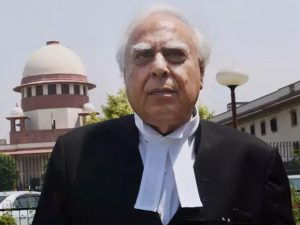 CAs Pankaj Agrwal and Sandeep Kumar Jain have dealt with the interesting issue whether a professional is entitled to rely on Section 44ADA of the Income-tax Act, 1961 and declare his income as being 50% of the gross receipts even though the actual income is in fact higher. They have also considered whether there is a risk of the Department claiming in later years that the difference between the actual income (reflected by investments) and returned income is “undisclosed income”
CAs Pankaj Agrwal and Sandeep Kumar Jain have dealt with the interesting issue whether a professional is entitled to rely on Section 44ADA of the Income-tax Act, 1961 and declare his income as being 50% of the gross receipts even though the actual income is in fact higher. They have also considered whether there is a risk of the Department claiming in later years that the difference between the actual income (reflected by investments) and returned income is “undisclosed income”
In a professional group discussion, a member raised the following query which evoked mixed response:
(a) Can a professional declare his income equal to 50% of his gross receipts as per provisions of Section 44ADA "EVEN" if his actual income comes to, say 75% of his gross receipts after meeting all his expenses related to profession?
(b) Can the Department in future claim the difference of his investments and returned income as undisclosed income in later years?”
 Advocate V. P. Gupta has explained the scheme of faceless assessments and appeals in a precise manner. He has compared the provisions of the scheme with that prevalent in the USA and pinpointed the advantages and benefits to taxpayers. The ld. author has identified a few issues where clarifications from the Government is desired. He has also offered valuable suggestions on how the scheme can be made better
Advocate V. P. Gupta has explained the scheme of faceless assessments and appeals in a precise manner. He has compared the provisions of the scheme with that prevalent in the USA and pinpointed the advantages and benefits to taxpayers. The ld. author has identified a few issues where clarifications from the Government is desired. He has also offered valuable suggestions on how the scheme can be made better  CA Rajat Power has pointed out that section 44AB of the income-tax Act, 1961, which provides for tax audit of certain taxpayers, has been amended in the recent past in order to relax the compliance burden on small taxpayers. However, while these amendments are well-intentioned, they have increased confusion amongst taxpayers. The Ld. author has explained the law in a simple manner and provided clarity on the subject
CA Rajat Power has pointed out that section 44AB of the income-tax Act, 1961, which provides for tax audit of certain taxpayers, has been amended in the recent past in order to relax the compliance burden on small taxpayers. However, while these amendments are well-intentioned, they have increased confusion amongst taxpayers. The Ld. author has explained the law in a simple manner and provided clarity on the subject  CA Rohan Sogani has dealt with the important issue whether electronic data/information found in hard disks, pen drives, etc is admissible as evidence for the Income-tax Department to make additions and disallowances. The ld. author has explained the law in the context of the Income-tax Act, 1961, the Information Technology Act, 2000 and the Evidence Act, 1872. He has referred to all the important judgements and also emphasized the procedures that the Department is duty bound to follow to ensure the admissibility of the evidence.
CA Rohan Sogani has dealt with the important issue whether electronic data/information found in hard disks, pen drives, etc is admissible as evidence for the Income-tax Department to make additions and disallowances. The ld. author has explained the law in the context of the Income-tax Act, 1961, the Information Technology Act, 2000 and the Evidence Act, 1872. He has referred to all the important judgements and also emphasized the procedures that the Department is duty bound to follow to ensure the admissibility of the evidence.  Advocate Arjun Gupta has explained the entire law relating to revision of assessments by the CIT under section 263 of the Income-tax Act, 1961. The ld. author has clearly delineated the extent of the power of the CIT and its limitations. The implications of Explanation 2 to section 263, which was inserted by the Finance Act, 2015, have also been explained in a succinct manner. All the important judgements on the subject have been referred to
Advocate Arjun Gupta has explained the entire law relating to revision of assessments by the CIT under section 263 of the Income-tax Act, 1961. The ld. author has clearly delineated the extent of the power of the CIT and its limitations. The implications of Explanation 2 to section 263, which was inserted by the Finance Act, 2015, have also been explained in a succinct manner. All the important judgements on the subject have been referred to  CA Rohit Kapoor has conducted a detailed study of section 153C and allied provisions of the Income-tax Act, 1961 which deal with search assessments. He has identified all the specific controversies that arise and answered them with clarity with reference to the statutory provisions and judicial precedents.
CA Rohit Kapoor has conducted a detailed study of section 153C and allied provisions of the Income-tax Act, 1961 which deal with search assessments. He has identified all the specific controversies that arise and answered them with clarity with reference to the statutory provisions and judicial precedents.  Lecture on Art of Advocacy by Rajya Sabha MP and Senior Advocate Kapil Sibal (SOL, Manipal University Jaipur and Excellence, April 28, 2020)
Lecture on Art of Advocacy by Rajya Sabha MP and Senior Advocate Kapil Sibal (SOL, Manipal University Jaipur and Excellence, April 28, 2020) CA Anilkumar Shah has explained the law relating to the taxation of donations to the corpus of a trust which is not registered under sections 12A/AA of the Income-tax Act, 1961. He has analyzed the statutory provisions and the important judgements on the point. He has also offered valuable guidance on what trusts should do in practice to be able to argue that the corpus donations received by them are capital in nature and not taxable as income
CA Anilkumar Shah has explained the law relating to the taxation of donations to the corpus of a trust which is not registered under sections 12A/AA of the Income-tax Act, 1961. He has analyzed the statutory provisions and the important judgements on the point. He has also offered valuable guidance on what trusts should do in practice to be able to argue that the corpus donations received by them are capital in nature and not taxable as income CA Rajendra Agiwal has provided valuable insights on the question whether a notice issued in the name of a deceased assessee is valid or not. He has also analyzed whether the “co-operation” of the legal representatives makes a difference to the legal position in the context of section 292BB of the Income-tax Act, 1961. All the relevant statutory provisions and important judgements of the Courts and Tribunal have been referred to by the ld. author
CA Rajendra Agiwal has provided valuable insights on the question whether a notice issued in the name of a deceased assessee is valid or not. He has also analyzed whether the “co-operation” of the legal representatives makes a difference to the legal position in the context of section 292BB of the Income-tax Act, 1961. All the relevant statutory provisions and important judgements of the Courts and Tribunal have been referred to by the ld. author